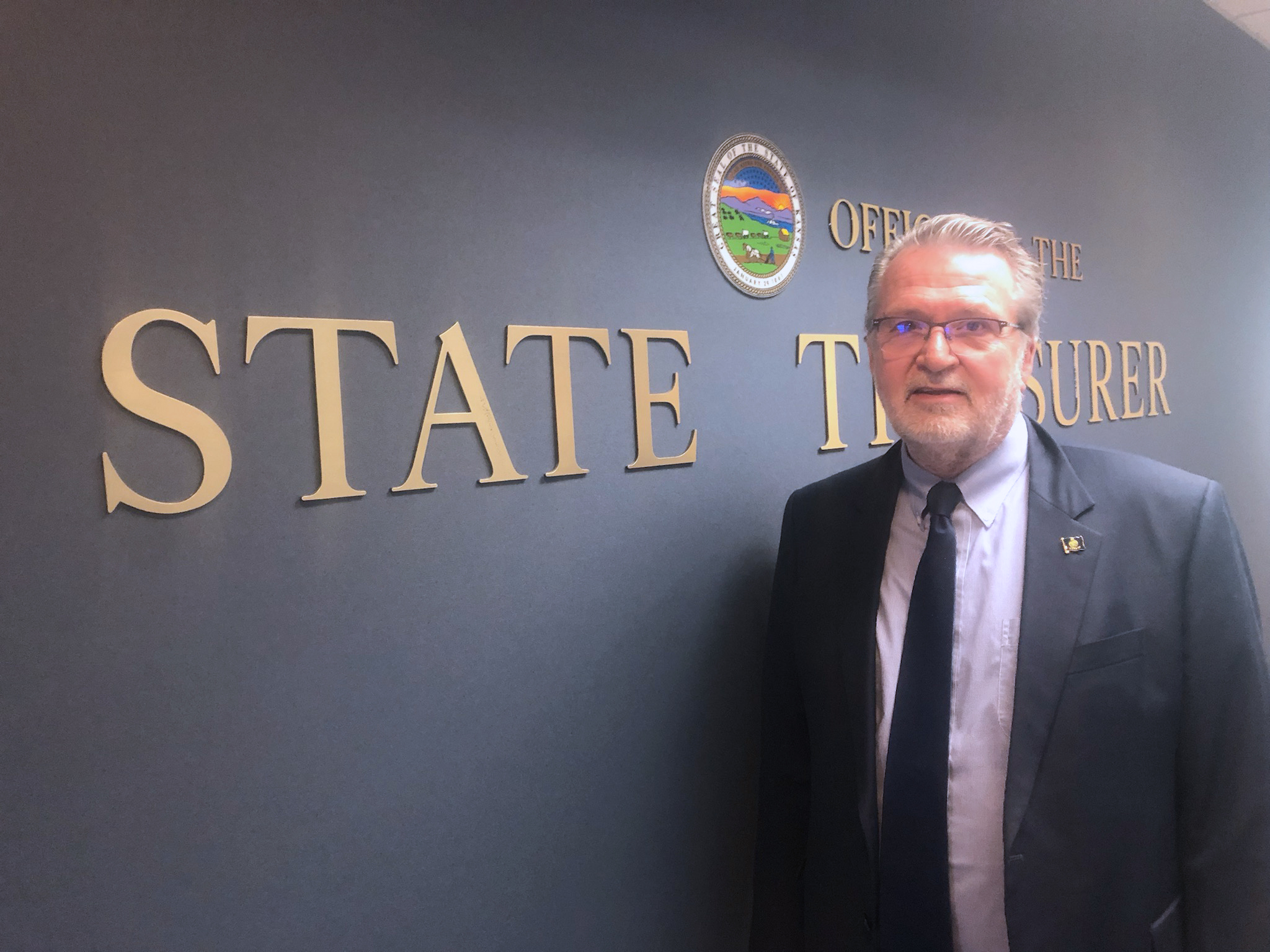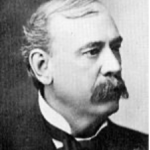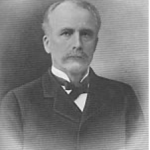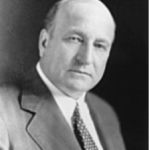TOPEKA — Don’t hang out with Lynn Rogers at the Kansas state Capitol unless you want to talk to people. A lot of people.
After a legislative hearing one afternoon last month, the state Treasurer and longtime Wichita resident lingered in the wing outside for 15 minutes chatting up lawmakers and anybody else who wandered by. Spotting Gov. Laura Kelly descending some stairs, he darted over to say hello and take her photo with a couple of high school students.
After more hellos, Rogers eventually made his way through the ornate rotunda and down stairs to the Capitol’s visitors center, only to encounter leaders of several Wichita-based nonprofits. He greeted each by name and shared news of home. He called out to a man he’d met at a pancake dinner in Liberal the previous week. He invited an activist to visit his office the next time she was in town. He recognized a woman from Shawnee Mission — despite her mask — and was soon congratulating her son and other members of a state championship high school swim team.
“He has this wide network of people from all over the state, which means he can’t go anywhere without knowing somebody,” said Roger’s wife, Kris, who was accompanying him that day.
Not that he’d want to.
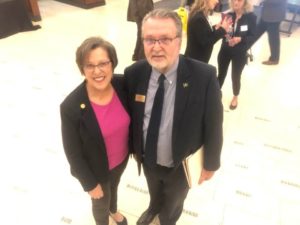
Kris Rogers joined her husband in Topeka after beating breast cancer, helping him with communications during his time as a state senator. “They’re a good team,” Rogers’ campaign treasurer, Jill Docking, said. “In politics, it helps to have someone who’s there for you.”
Building a network
Rogers started building that network as a banker lending money to farmers and other agricultural interests. He grew up on a large hog farm in Nebraska. One grandfather was a county commissioner, and his father served on the local school board. After graduating from the University of Nebraska, Rogers worked for Citibank Savings in Chicago, then moved to Wichita with his wife, Kris, also a Nebraska native, in 1985 to take a job with the Farm Credit Bank. He became a vice president of CoBank in 1993.
The Rogers settled in the Riverside area. Kris taught elementary school and later worked in a church ministry while Lynn helped lead the school district’s successful $285 million bond drive in 2000, its first since the 1970s. He won a seat on the Wichita School Board the next year and served until 2017, including seven years as president or vice president.
“The reason was to make sure we implemented the bond issue as we promised the electorate, which I felt we did,” he said. Board members also “worked really hard to restore trust in the board and public education, and also had to fight for adequate funding so our kids received the education they deserved.”
In 2015, Rogers changed his political affiliation from Republican to Democrat, primarily because he felt local Republican Party officials refused to adequately fund schools. He filed for the state Senate seat then held by Michael O’Donnell, who decided to run for Sedgwick County Commissioner instead. Rogers won with 58 percent of the vote.
In Topeka, Rogers sat next to then-state Sen. Laura Kelly, who turned into a mentor, possibly because Rogers was the only new Democratic senator. “She really knew her stuff when it came to the budget and ways and means, and I talked to her about education and agriculture,” he said.
Kris came along to help with writing newsletters and social media posts, having retired when the couple’s youngest child graduated from high school. Kris, who had just recovered from breast cancer, said she made the move “just because life was open.” Lynn retired from banking, realizing the legislative sessions took up too much time to do both. Rogers spent much of his legislative term trying to overturn the controversial fiscal policies of former Gov. Sam Brownback.
Higher office
In the spring of 2018, Kelly leaned over and asked Rogers if he wanted to be her running mate in a bid for the governor’s office, recognizing that support in the Wichita area would be critical to her campaign. “I said ‘Yeah sure, what kind of trouble can that get me in?’” Rogers recalled with a grin. The duo defeated the Republican ticket of Kris Kobach and Wichita businessman Wink Hartman.
As lieutenant governor, Rogers was put in charge of the Office of Rural Prosperity. He visited 75 of the state’s 105 counties, holding town hall meetings in many. Pushing for better rural broadband access was one key priority. Thanks partly to federal pandemic emergency funds, about 50,000 more Kansans have that access today, Rogers said, although “there’s still a lot of sections that don’t have any.”
“I loved being lieutenant governor, loved the travel,” Rogers said. In December 2020, however, Kelly asked him to take over as treasurer from Jake LaTurner, who had won election to the U.S. House of Representatives. Although no longer first in line to succeed Kelly, political observers noted that the treasurer is actually one of the best jobs in state government, with three of Rogers’ predecessors — LaTurner, Ron Estes and Lynn Jenkins — using it as a springboard to the U.S. Houses of Representatives.
The job is kind of a hybrid, carrying out mostly nonpartisan and uncontroversial duties. Rogers oversees a staff of 30 people. The treasurer is the state’s chief financial officer, receiving money collected by state agencies, depositing those funds in Kansas banks designated as state depositories and distributing state funds to city and county governments. But it also runs the Kansas Learning Quest Division, which is a college savings program the Legislature created in 1999, and the Unclaimed Property Division, which tries to reunite Kansans with money and property they’re owed. The latter task is, naturally, very popular and one that Rogers admits is his favorite part of the job.
The race ahead
Rogers’ office is no longer in the magnificently restored Capitol but rather across the street in the Landon building, one-time headquarters of the Atchison, Topeka and Santa Fe Railway. Sometimes, he’ll recognize someone walking to the Capitol, tap on his window and wave. He returns to Wichita most weekends but keeps an apartment on the 10th floor of the former Hotel Kansan, within easy walking distance of the Capitol. When not working, he enjoys reading, dining out and keeping up with three children and three grandchildren spread among Wichita, Kansas City and Oklahoma City.
Rogers said he wants to not just keep the state “in the right place financially,” but also help individual residents when possible.
During this legislative session, for instance, he pushed for the creation of a retirement savings program for employees of small businesses that would have been run by his office, similar to the college savings program it already administers. Noting that over half the state’s residents have no retirement savings, Rogers said such a program would give participants “more dignity and control over their lives” during retirement. The proposal, which was backed by AARP, appeared unlikely to be approved this session, but Rogers vowed to bring it back next year.
To do that, Rogers will have to win his first statewide election on his own later this year. Four Republicans are vying for that party’s nomination for treasurer. Republicans criticized Kelly for appointing a Democrat to fill out LaTurner’s term. Rogers countered that unlike his Republican predecessors, he has no plans to run for Congress.
Rogers’ campaign treasurer, Jill Docking, is the widow of Tom Docking, who was elected lieutenant governor from Wichita in the 1980s. Docking said Rogers still carries much support from the party he left.
“He is who he is all the time,” she said. “There’s never any front of anything that’s not transparent about Lynn, which is sort of his appeal in the state of Kansas.”
If Rogers gets the job for four more years, it’ll surely have something to do with all the folks he’s stopped to talk to along the way.
“I like to say I can remember their first name, last name or city, but not always all three,” he said.
Is Wichita cursed in statewide politics?
As a history lover, Lynn Rogers has wondered why the Wichita area hasn’t produced more statewide officeholders in recent decades even though it’s Kansas’ largest city. In fact, it’s been over a century since the last governor from Wichita — Henry Allen — took office in 1919.
“Somebody told me one time there’s a curse,” Rogers said. “I don’t quite believe that. I guess I’m not quite sure” why.
Rogers said one factor may be the city’s location, which puts it as close to Oklahoma City as to the state’s other big population center in northeast Kansas.
Before Allen, two other Wichitans served as governor: Lorenzo Lewelling (1893-95) and William Stanley (1899-1903). John McCuish of Newton was elevated from lieutenant governor to governor for 11 days in 1957 after his predecessor resigned, and Edward Arn, the state’s 32nd governor, practiced law in Wichita but not at the time he was elected governor in 1950.
George McGill was the last Wichitan elected to the U.S. Senate, which also takes a statewide vote, in 1930. Current Kansas Insurance Commissioner Vicki Schmidt and former Treasurer Ron Estes, now in Congress, won statewide election from Wichita. But for the most part, the area hasn’t filled many of the state’s highest offices, and that’s something Rogers would like to see change.
“I do think that south central Kansas deserves more representation,” Rogers said.
Contact Joe Stumpe at
joe@theactiveage.com.
